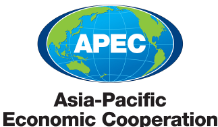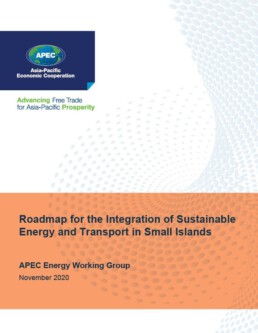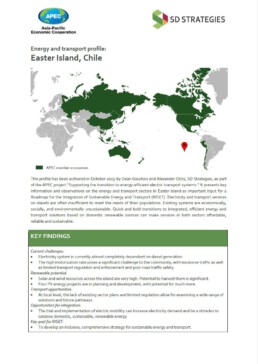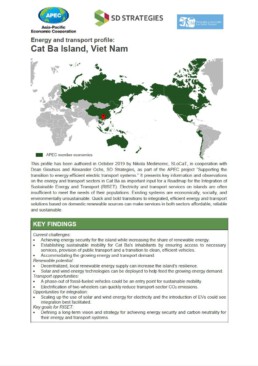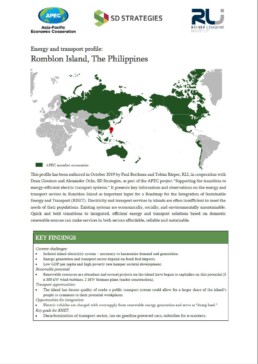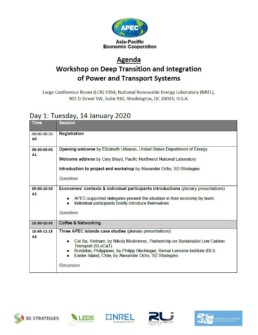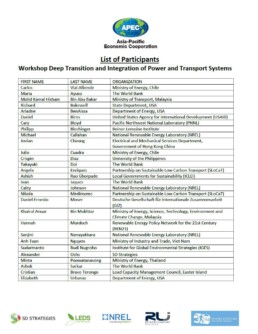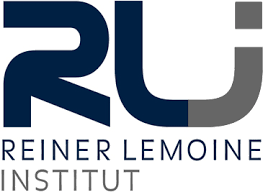Integrating Sustainable Energy and Transport in Islands
Background
Many APEC islands spend a high share of their GDP on the imports of fossil fuels. Often, this makes them dependent on foreign energy supplies and vulnerable to price fluctuations. The burning of fossil fuels pollutes local environments, endangers the health of citizens, and contributes to climate change. It also prevents innovative new technical advancements. Alternatives to socially, economically and environmentally unsustainable energy systems exist.
Recent years have seen enormous improvements in energy efficiency, unparalleled growth in renewable energy, and breathtaking innovations in the transport sector, including the market-penetration of electric vehicles (EVs). Communities around the world have demonstrated how energy and transportation systems can be integrated based on renewable energies and a high degree of efficiency to make both sectors reliable, affordable, and sustainable. The benefits of such low-emissions development strategies include energy and mobility cost savings and price stability, reduced fuel import dependency, better health situations, and new business opportunities.
The Project
We work with political personnel and leading experts to investigate current island energy situations and alternative future scenarios. We have developed a roadmap methodology that can guide economies – of all sizes and in all circumstances – in how to transition to energy-efficient, renewable-based, electric transport system.
Key components of the project are:
1. An integrated renewable energy and EV roadmap
2. Three “champion” island profiles
2. An in-person training and consultation workshop
4. An online webinar and broad dissemination of insights and final results
5. An alumni network of experts and decision-makers and their integration in the activities of the LEDS Global Partnership and other leading initiatives.
The three champions islands will serve as case studies. A workshop will train participants from the three champions islands and other APEC economies in what to learn from the three island cases and how to use the roadmap as well as individual tools it includes. Insights from the project and final products such as the roadmap will be disseminated broadly to benefit as many decision-makers and interested recipients as possible. Objectives The primary objectives of the project are to:
Energy and transport integration roadmap
This report highlights the economic, social, and environmental benefits that a transition towards EV-based mobility based on domestic renewable energy sources can create in APEC islands. Two tools are presented that islands can apply to plan their transition: The Avoid-Shift-Improve framework and its use in Island Mobility Plans define the role of EVs within a broad set of sustainable transport options. The multi-criteria decision-making method allows for the evaluation of different energy pathways, and the selection of one as part of an effective stakeholder dialogue.
Island's Profiles
Our three island profiles present key information and observations on the energy and transport sectors in Cat Ba (Vietnam), Easter Island (Chile), and Romblon (The Philippines). The islands were selected in cooperation with national, subnational and local authorities in supportive APEC economies. They have in common that they carry the potential to become Champion Islands for quick and ambitious integration of their energy and transport sectors based on electric vehicles and the efficient use of domestic renewable power. The island profiles served as important case studies for discussion at the workshop and create key reference points for the final project output, the Roadmap for the Integration of Sustainable Energy and Transport (RISET).
In Person Workshop
On 14 and 15 January 2020, we brought together 30 individuals representing APEC islands and economies, international organizations and leading research institutes for a workshop on Deep Transition and Integration of Power and Transport Systems. The meeting took place at the National Renewable Energy Laboratory’s Washington D.C. Office. Objectives of the workshop were to jointly advance the roadmap, including through sharing regional experiences and best practices as well as results from technology assessments, modelling exercises and the use of other tools; to discuss the roadmap overall concept, its methodology and major assumptions; and to learn from successful and failing transitional efforts in the region and beyond. Participants in the workshop jointly explored regulatory and institutional frameworks that can attract clean energy and transport investments.
Presentations
Day 1.
- Asia – Pacific Economic Cooperation and Clean Energy Activities – Cary Bloyd – Pacific Northwest National Laboratory
- Introduction to Project and Workshop – Alexander Ochs – SD-Strategies
- Thailand: Deep Transition and Integration of Power and Transport System – Minta Poowatanavong – Ministry of Energy
- Philippines: Deep Transition and Integration of Power and Transport System – Crispin Diaz – University of Philippines
- Chile: Deep Transition and Integration of Power and Transport System – Julio Cuadra & Carlos Vial – Ministry of Energy & Cristian Terongo – Load Capacity Management Council Easter Island
- Hong Kong China: Deep Transition and Integration of Power and Transport System – Jovian Cheung – Electrical and Mechanical Services Department, Government of Hong Kong China
- Malaysia: Deep Transition and Integration of Power and Transport System – Mohd Kamal Hisham bin Abu Bakar – Ministry of Transport & Khairul Anuar bin Mukhtar – Ministry of Energy, Science, Technology, Environment and Climate Change
- Viet Nam: Deep Transition and Integration of Power and Transport System – Nguyen Anh Tuan – Ministry of Industry and Trade
- Island of Cat Ba: Transport and Electricity Profile – Nikola Medimorec – Partnership on Sustainable Low Carbon Transport
- Romblon and Philippines: Transport and Electricity Profile – Paul Bertheau & Tobias Rieper & Philipp Blechinger
- Easter Island: Transport and Electricity Profile – Alexander Ochs – SD-Strategies
- Assessing the Full Deck of Smart Transport Solutions – Caley Johnson – National Renewable Energy Laboratory (NREL)
- Renewable Energy and Transport – Hannah E. Murdock – Renewable Energy Policy Network for the 21st Century (REN21)
- Analysis Low Carbon Transport Action and Projects in Indonesian Cities – Sudarmanto Budi Nugroho – Institute for Global Environmental Strategies (IGES)
- Multi-Criteria-Decision- Making for alternative energy supply scenario – Philipp Blechinger – Reiner Lemoine Institute
Day 2.
- ICLEI South Asia- Electric Mobility Initiatives – Ashish Rao Ghorpade – Local Governments for Sustainability (ICLEI)
- Electric Mobility Strategies for Mexicali, MX and Saint Kitts and Nevis – Caley Johnson – National Renewable Energy Laboratory (NREL)
- Local Implementation of NDC: Solar Energy and Electromobility in Arequipa – Natalie Rona
- Creating an Attractive Investment Environment for Sustainable Energy Solution – Alexander Ochs – SD-Strategies
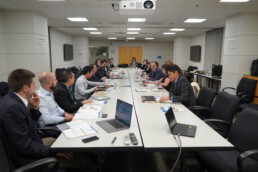
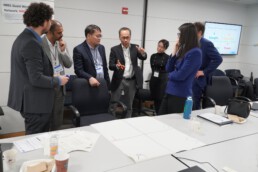
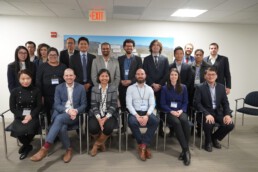
Our Partners:

